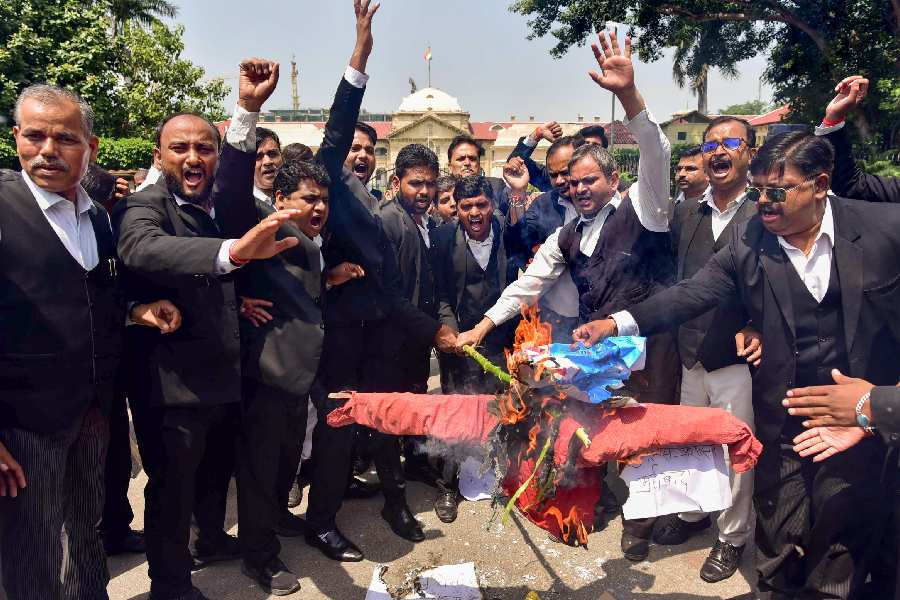Jahanvi Agarwal
On August 24, 2024, the Allahabad High Court made a significant ruling regarding the conduct of lawyers in Uttar Pradesh, particularly focusing on strikes called by individual lawyers or their associations.
The Court declared that any act of striking or calling for a strike would be treated as an act of “ex facie criminal contempt” — meaning it would be seen as contempt of court without needing further proof. This ruling came in response to the frequent disruptions caused by lawyer strikes in Prayagraj, which had severely affected judicial work.
A Division Bench comprising Justice Ashwani Kumar Mishra and Justice Dr. Gautam Chowdhary issued strict directions to ensure that the functioning of courts is not hampered. They instructed all District Judges in Uttar Pradesh to report any instances of lawyer strikes to the Registrar General so that appropriate legal action could be initiated.
The Court also emphasized that bar associations should not abstain from work even for condolence meetings due to the death of a lawyer, court officer, employee, or their relatives. Such meetings, if necessary, were ordered to be held only after 03:30 PM. The Bench made it clear that “any violation of this direction would also be viewed as an act of ex facie contempt.”
The Court’s decision was driven by the belief that the administration of justice relies on the smooth and effective operation of courts. The Bench pointed out that when courts are unable to function at their full capacity due to frequent strikes by lawyers, the very foundation of the legal system is at risk of crumbling. “If the courts are not allowed to function at its optimal level on account of frequent calls of strikes by lawyers, the very edifice on which the entire system rests may crumble,” the Bench remarked.
The Court’s concern was heightened after reviewing a report from the District Judge in Prayagraj, which revealed that between July 2023 and April 2024, judicial work had been disrupted on 127 out of 218 working days due to strikes. Citing a Supreme Court judgment that stated lawyers do not have the right to go on strike, the Allahabad High Court sought assistance from the Bar Council of India (BCI), the UP Bar Council, and the High Court Bar Association to develop a mechanism to curb the strikes in district courts across the state.
The Registrar General’s report further highlighted that across Uttar Pradesh, the judicial work in district courts was severely hampered by lawyer strikes, with actual working days being substantially reduced. This has placed additional strain on already overburdened courts in the state.
The Court noted the submissions of BCI Chairman Manan Kumar Mishra and Senior Counsel RK Ojha, representing the Bar Council of Uttar Pradesh. Both expressed opposition to lawyer strikes and affirmed their commitment to upholding the Supreme Court’s rulings on the matter. The UP Bar Council had even passed a resolution urging lawyers not to abstain from work, even in the event of a condolence.
Acknowledging the pressing need for effective measures to ensure strict compliance with the ban on lawyer strikes, the Court stated, “People of this State have reposed faith in the Courts to resolve their disputes and protect their valuable rights guaranteed by the Constitution of India. This faith cannot be allowed to be compromised by a section of irresponsible advocates who place their own interest over and above the interest of the common man.”
However, the Court also recognized the genuine difficulties and hardships faced by lawyers, which sometimes compelled them to resort to strikes. To address these concerns, the Court suggested the formation of a Grievance Redressal Committee at both the High Court and district court levels. This committee would provide a platform for lawyers to voice their legitimate grievances without resorting to strikes. It was noted that such committees already exist, but the Court agreed to include the District Magistrate or a nominee not below the rank of Additional District Magistrate in these committees to enhance their effectiveness.
In its order, the Court requested the Registrar General to issue directions to all District Judges across Uttar Pradesh to include the District Magistrate or their nominee in the Grievance Redressal Committees at the district level. The inclusion was seen as a step towards making these committees more effective in addressing lawyers’ grievances and ensuring the smooth functioning of courts. The Court has scheduled the next hearing on this matter for September 25, 2024.
Case Name: In Re. District Bar Association of Prayagraj
Case Number: Contempt Application (Criminal) No. – 12 of 2024
Bench: Justice Ashwani Kumar Mishra and Justice Dr. Gautam Chowdhary

